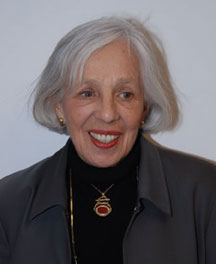|
PROFILES: News about people from AGI and its 44 member societies
Archive of past Society Page/Profiles stories by date
At first light: Q & A with Maxine Singer
 |
| Maxine Singer, president emerita of Carnegie Institution of Washington, spearheaded several groundbreaking science education programs during her tenure. Photograph is courtesy of Johnson & Johnson. |
Throughout her career, Maxine Singer has been a pioneer, not only in the field of microbiology, but also on issues ranging from science education and the difficulties that women in science face, to fundamental ethical questions raised by cutting-edge scientific research.
During her tenure as president of the Carnegie Institution of Washington from 1998 to 2002, Singer oversaw the construction of the twin Magellan telescopes at Las Campanas Observatory in Chile; the development of the Department of Global Ecology, Carnegie's first new department in 80 years; and the creation of two pioneering science education programs: the "First Light" Saturday science school for Washington, D.C., students, and the Carnegie Academy for Science Education (CASE) program, which helps the District's K-12 science teachers learn more about science.
In January 2007, Singer was awarded the National Academy of Sciences' Public Welfare Medal, in recognition of her leadership not only as a scientist, but also in advancing science education and addressing scientific ethical issues. Geotimes reporter Carolyn Gramling caught up with Singer to talk about leading Carnegie, teaching middle school and why scientists who work on ethical and education issues should not stray too far from their roots.
CG: What is the most important issue to you, in terms of science education?
MS: The fundamental issue is that, by and large, even in the best of schools, science education tends to be poor, and it tends to catalyze a disinterest among students rather than an interest.
CG: Tell me about how the First Light program got started.
MS: When I came to Carnegie Institution … I knew that I lived in a city where public education in general was not what it should be — science and math education in particular — so it seemed like an effort to focus on this city would be a useful thing to do.
I recognized that it was in an area that I knew nothing about, and so I should start small. I had the idea of a Saturday science school, and I was fortunate and found a very gifted teacher who was interested in establishing it. With his help, I took an old shipping room and made a wet lab for kids. In the fall of 1989, [the program] began to recruit kids from the neighborhood. First Light has always been for kids in D.C. public schools and remains that way to this day. It was for elementary and is now for middle school students.
CG: Why the change in age
group?
MS: There were several reasons — middle school has been identified by a lot of researchers as one of the critical times for kids, when they change from relatively docile elementary school kids to people who think on their own and … begin to reject school, and reject science, because it's not taught in an interesting way. There are rarely connections made between science and math and between science and anyone's life. [Today], most kids are very facile with technology … their whole world is defined in that way. But when they go into a classroom, it's a different world; technology is not used a lot.
CG: What was your reaction to being awarded the NAS Public Welfare Medal?
MS: I was really thrilled — I'm very excited about this, partly because it comes from my colleagues, and that means a lot. It was also a great pleasure to realize that two former presidents of Carnegie have also received the award.
CG: Now that you've retired as president, how are you spending your time?
MS: I teach a two-week course in the summer for [science] teachers, and oversee some other teaching in the summer. I occasionally go to First Light on Saturdays. And I still go to my lab at the National Institutes of Health. I'm trying to learn bioinformatics, which turns out to be a lot of fun to learn, it's challenging and interesting. I also travel now, not for business but to visit far-flung family.
CG: Do you still work on ethical issues? Any advice for scientists who do?
MS: Before I ever came to Carnegie, I was involved in the public consideration of recombinant DNA … that was the beginning of my looking outside of the lab. We established some principles that I can see still functioning in the scientific community, but the new problems are even more difficult and more political, in a way.
For scientists who are interested in being involved in the public issues that come from science — whether science education or ethics or policy — I think it's really important to stay rooted in the science, to keep up with the changing ideas and paradigms in the science. Because if you lose that, if you lose the ability to understand what's really going on, then I think you can't possibly be very effective in public issues. Your forays into policy or education are going to be compromised.

 Subscribe
Subscribe


